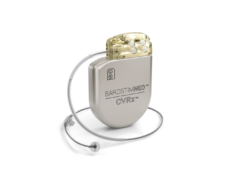 Results from the MultiSENSE study have demonstrated that a new multisensor algorithm, the HeartLogic Heart Failure Diagnostic Service (Boston Scientific), provides a timely alert to predict impending heart failure decompensation.
Results from the MultiSENSE study have demonstrated that a new multisensor algorithm, the HeartLogic Heart Failure Diagnostic Service (Boston Scientific), provides a timely alert to predict impending heart failure decompensation.
Data were presented by principal investigator John P Boehmer (medical director of the Heart Failure Program at The Pennsylvania State University College of Medicine and The Penn State Hershey Medical Center, Hershey, USA) at a late-breaking trial session at the American Heart Association (AHA) scientific sessions (12–16 November, New Orleans, USA).
The MultiSENSE (Multisensor chronic evaluation in ambulatory heart failure patients) study showed that the HeartLogic alert had an observed sensitivity of 70% and a low unexplained alert rate of 1.47 per patient per year. Additionally, it demonstrated the HeartLogic alert could successfully notify clinicians of an associated event—defined as hospitalisations with heart failure as the primary diagnosis and heart failure outpatient treatment with intravenous therapy—with a 34-day median alert window.
“The primary endpoints were exceeded and demonstrated that this algorithm, which mimics the activity and analysis of a clinician by combining multiple measurements evaluating different aspects of heart physiology, is a strong predictor of heart failure events,” said Boehmer. “The study illustrates compelling performance of the HeartLogic algorithm for the detection of worsening heart failure and lays the foundation for future studies of the alert in clinical practice.”
The study included 900 patients who had enhanced sensor data collection enabled in their cardiac resynchronisation therapy defibrillator (CRT-D) systems and were followed for up to one year in either a development or test cohort. Information from the 500 patients within the development set was used to construct the HeartLogic composite index and alert algorithm by combining heart sounds, respiration rate and volume, thoracic impedance, heart rate and activity. The 400 patients within the test set were sequestered for subsequent independent validation of HeartLogic.
Boehmer commented that further studies are needed to establish whether this type of heart failure alert can improve patient outcomes.
Boston Scientific has announced that it has submitted a design dossier for CE mark and a premarket approval application for US Food and Drug Administration (FDA) approval of the HeartLogic service and plans to conduct post-approval studies, including the MANAGE-HF (Multiple cardiac sensors for management of heart failure) to further evaluate the alert.









